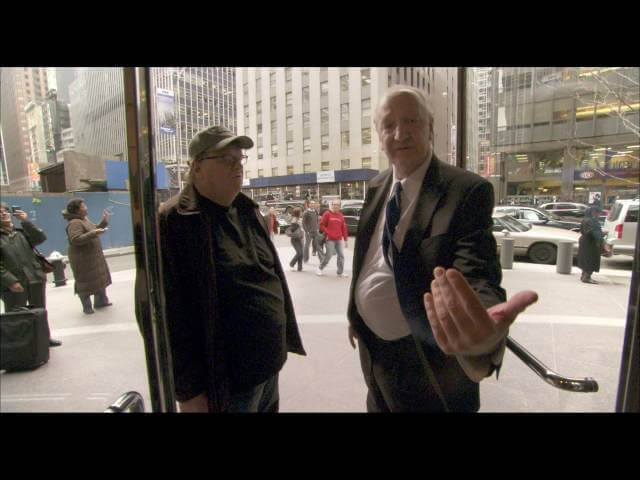Toronto Film Festival '09: Day 4

Capitalism: A Love Story
Director/Country/Time: Michael Moore/USA/105 min.
Program: Special Presentations
Headline: Fat man takes on fatcats
Noel’s Take: As smug and self-aggrandizing as Michael Moore can be, he’s generally pretty good at what he does, and what he does serves a function. Moore rouses the rabble, making the disenfranchised feel like they're part of a larger community; and he simplifies (some would say oversimplifies) complicated political issues. Moore's latest cine-essay Capitalsm: A Love Story suffers from all the usual problems that afflict Moore's movies. The moment Moore’s ironically lilting voice appears over stock footage from pro-business industrial films, Moore-haters will likely feel the urge to punch something. And as he proceeds to trot out a bunch of disconnected anecdotes—a family losing their home to foreclosure here, a look at worker-owned factories there—as “proof” that the free-market is an outmoded concept, even staunch lefties may bristle at the speciousness of Moore’s arguments. (Moore seems to put more stock in the opinions of his Catholic priest or actor Wallace Shawn than he does in anyone actually involved with the world of business today.) Yet Moore’s gifts for putting a relatable human face and story to a larger issue are on display in Capitalism from time to time. When Moore tells about a Pennsylvania community that privatized its juvenile detention facility with disastrous results, the story may not show definitively that capitalism is inherently morally bankrupt, but it does offer a sharp rebuttal to those who insist that private is always better than public. The biggest problem with Capitalism is that it feels oddly out of touch. In the current political climate, the kind of angry average American that Moore’s spent a lifetime championing is more likely to be out in the streets yelling for the heads of liberals like Moore, while the kind of people who look to Moore for trenchant social commentary are likely watching The Daily Show and reading The Daily Dish. Capitalism shows that Moore is still capable of making good points in an entertaining way, but more often than not in this movie he’s just telling us things we already know. Snidely.
Grade: C+
The Art Of The Steal
Director/Country/Time: Don Argott/ USA/ 101 min.
Documentary
Program: Real To Reel
Headline: Barnes is dying, who’s got the will?
Scott’s Take: As a forward-thinking art collector in the ‘20s, Dr. Albert Barnes snapped up an extraordinary wealth of post-impressionist and modernist paintings from the likes of Matisse, Picasso, Renoir, and Cezanne; though dismissed by tastemakers at the time, his collection is now valued in the tens of billions. In his will, Dr. Barnes was very specific about what the trustees were to do with his assets: He wanted them to remain housed in his small, meticulously conceived institution in the Philadelphia suburb of Merion, never to be loaned out or sold to other museums. He wanted the Barnes trustees to continue his educational mission. And most of all, he wanted to make sure the corporate foundations and politicians in Philly didn’t get their grubby paws on it. The Art Of The Steal is about how Barnes’ seemingly ironclad wishes were withered away by unscrupulous trustees, coffer-draining legal battles, and the overwhelming force of a city looking to bring in the tourist dollar. There are two sides of the story—the other being that the Barnes Foundation simply didn’t have the capital to be a sustainable entity—but the film makes its allegiances clear. And that’s not a bad thing: In this David and Goliath story, Goliath kicks the ever loving shit out of David, and the film is convincing and righteous in its advocacy. It also leaves you with troubling questions about the runaway commodification of art, the extent to which it does or does not belong the public, and just how much power the individual really has in society. Grade: B
The Disappearance Of Alice Creed
Director/Country/Time: J Blakeson/UK/98 min.
Cast: Gemma Arterton, Eddie Marsan, Martin Compston
Program: Discovery
Headline: A carefully planned kidnapping takes some unexpected turns
Noel’s Take: The "disappearance" in the title of this taut British thriller refers to the kidnapping of a millionaire's grown daughter, as well as to the attitude her abductors try to take towards her in order to complete the job. She can't be seen as "Alice Creed." But it's hard not to see Alice as Alice, given how forcefully she likes to make her presence known. Almost as soon as Alice learns the rules of her imprisonment, she starts looking for a way to change them. As it happens, the two guys holding her have some plans and secrets of their own, and as the story plays on, writer/director J Blakeson toys with the audience’s sympathies, subtly altering our rooting interests. Alice Creed is a clever little contraption, making maximum use of three actors, a few locations, and a script that springs a new twist every ten minutes or so. When the movie runs out of twists, there's not much left, outside of some strong performances and the careful rendering of efficient modern kidnapping techniques. For as long as the ride lasts though, it's a fun one. Grade: B
Collapse
Director/Country/Time: Chris Smith/ USA/ 82 min.
Documentary
Program: Real To Reel
Headline: “That’s how I learned to separate the ice cream from the bullshit.”
Scott’s Take: The latest documentary from American Movie director Chris Smith takes the form of Errol Morris’ The Fog Of War, and in conspiracy theorist Michael Ruppert, he’s found a subject just as mesmerizing and irreducible as Robert McNamara. A former LAPD narcotics officer and independent journalist, Ruppert’s current obsession is the issue of “peak oil,” the concern that oil production has reached its apex and as fossil fuels decline, our entire industrial infrastructure will collapse along with it. Ruppert has the sort of apocalyptic vision that would make him perfect for Glenn Beck’s “War Room”—or Stephen Colbert’s “Doom Bunker,” for that matter—but he’s not an ideologue, which makes his Chicken Little scenarios more authentic even before you’re confronted with his confident voice and meticulously crafted arguments. That said, Collapse is by no means an endorsement of Ruppert’s worldview; Smith has enough respect for his audience to allow them to sort out whether he’s a soothsayer or a crackpot. It’s possible to come out of the film thinking, “Oh my God, we’re all doomed,” but there’s also a strong suggestion that Ruppert has walled himself into his own point-of-view by accepting only the information that supports his sweeping theories. And in several immensely poignant moments, we can also see an angry, lonely, vulnerable man whose life epitomizes the title as much as the globe does. There are many layers to the man and the movie, and I for one left the theater shaken. Grade: A
Get Low
Director/Country/Time: Aaron Schneider/USA/100 min.
Cast: Robert Duvall, Sissy Spacek, Bill Murray, Lucas Black
Program: Gala
Headline: Folksy folks do the bidding of mysterious old coot
Noel’s Take: So long as there are movies being made about stoic cranks with stubborn streaks, Robert Duvall will be able to find work. In director Aaron Schneider's debut feature Get Low, Duvall plays a 30s-era hermit who leaves his cabin in the woods and rides into town to ask for help planning his funeral—which he wants to hold while he's still alive. The movie's tone is as gentle and homespun as a bluegrass lullaby. It's meant to be funny and heartwarming and wise, and it is, for the most part, if in an over-familiar way. Get Low has the look and tone of a Hallmark Original, but quieter, and the story develops fitfully, largely because the screenplay by Chris Provenzano and C. Gaby Mitchell has to hold back Duvall’s big secret reason for throwing his "funeral party" until the end. When the big moment arrives though, it’s appropriately riveting. And Get Low is also helped along by two memorable supporting performances: one from Lucas Black, who brings his usual twangy authenticity to the role of a young family man encountering the reality behind a local legend; and the other from Bill Murray as a mortician who sees this free-spending backwoodsman as the golden ticket he's long been waiting for. With Duvall, you know what you're in for: a lot of guttural grunts and wistful, wrinkled stares. But Murray's a wild card, and when his faux-sincere huckster vibe rubs up against Black's idealism and Duvall's plainspokenness, Get Low gets better.
Grade: B








































